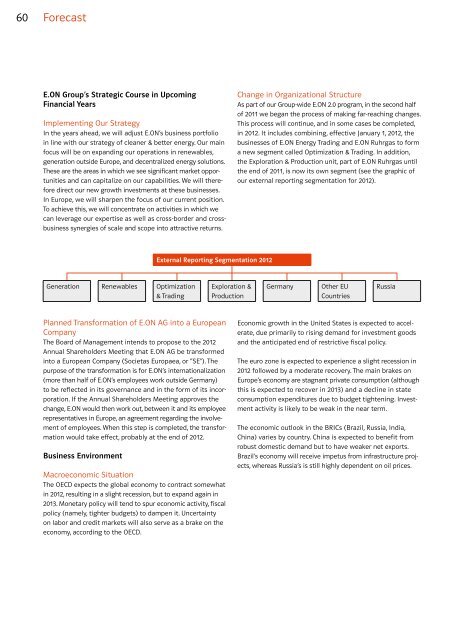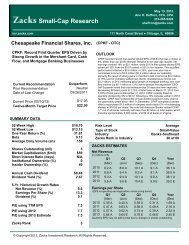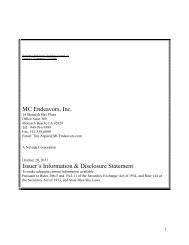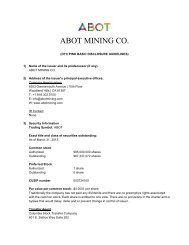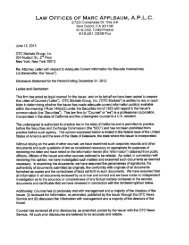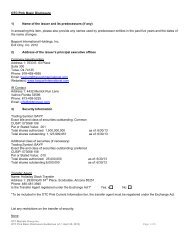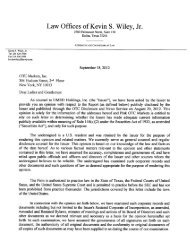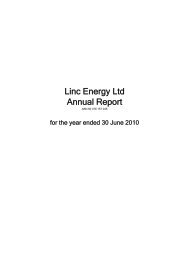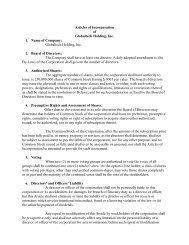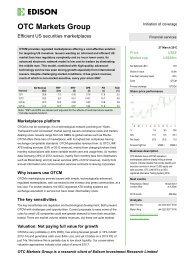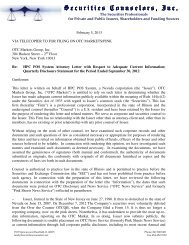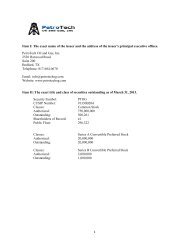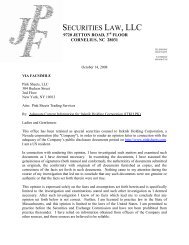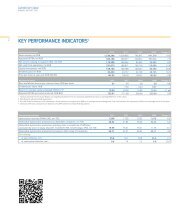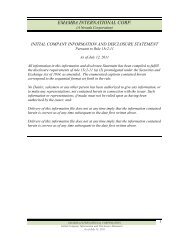2011 Annual Report - OTCIQ.com
2011 Annual Report - OTCIQ.com
2011 Annual Report - OTCIQ.com
You also want an ePaper? Increase the reach of your titles
YUMPU automatically turns print PDFs into web optimized ePapers that Google loves.
60 Forecast<br />
E.ON Group’s Strategic Course in Up<strong>com</strong>ing<br />
Financial Years<br />
Implementing Our Strategy<br />
In the years ahead, we will adjust E.ON’s business portfolio<br />
in line with our strategy of cleaner & better energy. Our main<br />
focus will be on expanding our operations in renewables,<br />
generation outside Europe, and decentralized energy solutions.<br />
These are the areas in which we see significant market opportunities<br />
and can capitalize on our capabilities. We will therefore<br />
direct our new growth investments at these businesses.<br />
In Europe, we will sharpen the focus of our current position.<br />
To achieve this, we will concentrate on activities in which we<br />
can leverage our expertise as well as cross-border and crossbu<br />
siness synergies of scale and scope into attractive returns.<br />
Generation Renewables Optimization<br />
& Trading<br />
Planned Transformation of E.ON AG into a European<br />
Company<br />
The Board of Management intends to propose to the 2012<br />
<strong>Annual</strong> Shareholders Meeting that E.ON AG be transformed<br />
into a European Company (Societas Europaea, or “SE”). The<br />
purpose of the transformation is for E.ON’s internationalization<br />
(more than half of E.ON’s employees work outside Germany)<br />
to be reflected in its governance and in the form of its incorporation.<br />
If the <strong>Annual</strong> Shareholders Meeting approves the<br />
change, E.ON would then work out, between it and its employee<br />
representatives in Europe, an agreement regarding the involvement<br />
of employees. When this step is <strong>com</strong>pleted, the transformation<br />
would take effect, probably at the end of 2012.<br />
Business Environment<br />
External <strong>Report</strong>ing Segmentation 2012<br />
Macroeconomic Situation<br />
The OECD expects the global economy to contract somewhat<br />
in 2012, resulting in a slight recession, but to expand again in<br />
2013. Monetary policy will tend to spur economic activity, fiscal<br />
policy (namely, tighter budgets) to dampen it. Uncertainty<br />
on labor and credit markets will also serve as a brake on the<br />
economy, according to the OECD.<br />
Exploration &<br />
Production<br />
Change in Organizational Structure<br />
As part of our Group-wide E.ON 2.0 program, in the second half<br />
of <strong>2011</strong> we began the process of making far-reaching changes.<br />
This process will continue, and in some cases be <strong>com</strong>pleted,<br />
in 2012. It includes <strong>com</strong>bining, effective January 1, 2012, the<br />
businesses of E.ON Energy Trading and E.ON Ruhrgas to form<br />
a new segment called Optimization & Trading. In addition,<br />
the Exploration & Production unit, part of E.ON Ruhrgas until<br />
the end of <strong>2011</strong>, is now its own segment (see the graphic of<br />
our external reporting segmentation for 2012).<br />
Germany Other EU<br />
Countries<br />
Russia<br />
Economic growth in the United States is expected to accelerate,<br />
due primarily to rising demand for investment goods<br />
and the anticipated end of restrictive fiscal policy.<br />
The euro zone is expected to experience a slight recession in<br />
2012 followed by a moderate recovery. The main brakes on<br />
Europe’s economy are stagnant private consumption (although<br />
this is expected to recover in 2013) and a decline in state<br />
consumption expenditures due to budget tightening. Investment<br />
activity is likely to be weak in the near term.<br />
The economic outlook in the BRICs (Brazil, Russia, India,<br />
China) varies by country. China is expected to benefit from<br />
robust domestic demand but to have weaker net exports.<br />
Brazil’s economy will receive impetus from infrastructure projects,<br />
whereas Russia’s is still highly dependent on oil prices.


